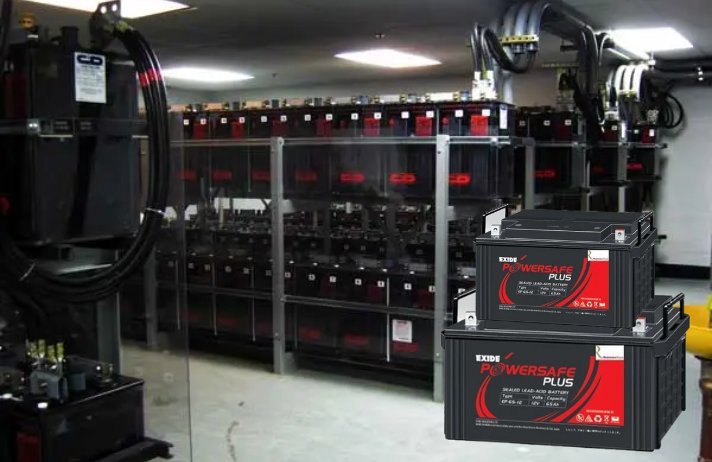Things to consider before choosing the UPS Batteries for your Industry
Tips to choose the UPS for your Industry Today's Industry can't have downtime. So, picking the right Uninterruptible Power Supply (UPS) for your facility is crucial. You may run a factory, data center, or other industrial facility. Keeping the power on is vital. It lets you stay productive, protect equipment, and avoid costly disruptions. But, with various UPS options available, choosing the right one can be overwhelming.

Definition of Industrial UPS An industrial uninterruptible power supply (UPS) is a specialist power protection tool that provides steady power. It's made for industrial settings and built to survive tough conditions. Industrial UPS units are for the high-power needs of data centers, plants, and other sites, which sets them apart from traditional UPS systems. An industrial UPS's primary purpose is to protect vital machinery and operations. It guards them from electrical disruptions. These include surges, voltage swings, and power outages. The UPS does this by instantly supplying backup power
Things to consider before choosing the UPS Batteries for your Industry
Assess Your Power Requirements: Begin by evaluating your facility's power needs. Consider factors such as the types of equipment you need to power, their power use, and any special voltage and frequency needs. Audit your facility's power demands. Include both current and expected loads. Identify equipment that must stay on during outages and prioritize power needs. Consider any specialized equipment or machinery with unique power requirements.
Understand Your Application: Different industrial environments have different power quality requirements. For instance, a data center might prioritize clean power to protect sensitive equipment. A plant may need a UPS to handle high inrush currents from heavy machines. Understanding your particular application will make reducing your alternatives easier. Different industrial applications have varying tolerance levels for power disruptions. For example, a drug factory may need uninterrupted power. This is to keep up product quality and meet regulations.
Calculate Your Runtime Needs Find out how long your facility needs to run on backup power in the event of a mains power failure. This will depend on factors such as how critical your operations are and how long it takes to shut down equipment safely or switch to alternative power.
Assess: How long does your facility need to run on battery power? Do a thorough assessment. Consider backup power sources. Also, consider plans to extend your runtime during prolonged outages. To ensure fault tolerance, use multiple UPS units or parallel systems. This minimizes single points of failure, making the configuration redundant.
Consider environmental factors: Industrial environments can be harsh, with exposure to dust, moisture, and temperature extremes. Look for UPS systems designed to withstand these conditions. They should provide reliable performance in harsh environments. Evaluate the environment in which the UPS will operate. This includes temperature, humidity, airborne contaminants, and space limits.
Evaluate scalability and redundancy: As your facility grows or your power needs change, you'll want a UPS system. It should quickly scale to handle more oversized loads. Also, consider if redundancy is required. It ensures fault tolerance and cuts the risk of downtime. Assess the UPS system's efficiency. Higher efficiency means less energy use and lower costs over time.
Ease of Maintenance: Evaluate how easy the UPS system is to maintain and service. The system has easily accessible parts. It also has user-friendly features. They make routine maintenance easier.
Assess Battery Technology: The type of battery used in a UPS can have a significant impact. It affects performance, maintenance needs, and lifespan. Standard battery technologies include lead-acid, lithium-ion, and nickel-cadmium. Base it on factors like cost, energy density, and lifespan.
Regular System Checks: Schedule routine maintenance. This includes regular system checks. They help find and fix issues early.
Look for Advanced Features: Modern UPS systems offer many advanced features that enhance reliability and efficiency. These features may include remote monitoring and management abilities, energy-saving modes, and predictive maintenance features. Assess which features are essential for your facility's needs.
Emergency Response Plan: Create and carry out an emergency response strategy to handle unexpected situations quickly. This involves keeping an inventory of replacement parts and having skilled maintenance staff on hand.
Consider Total Cost of Ownership: Upfront cost matters, but don't forget the long-term expenses of owning and operating a UPS system. Consider maintenance costs, battery replacement costs, energy efficiency, and any potential savings from avoiding downtime or equipment damage.
Plan for Installation and Maintenance: Finally, consider the logistics of installing and maintaining your UPS system. Make sure you have enough space, cooling, and access for installation. Also, set a regular maintenance schedule to keep your UPS at peak performance.
Choose the Best UPS Suppliers for Reliable Service Choose a reputable vendor. They have a track record of providing high-quality products and reliable customer support. Look for certifications and testimonials. They should be from other industrial customers. They ensure you're investing in a dependable solution. Follow guidelines and do thorough research to choose the suitable industrial UPS. Perfect Energy in Coimbatore is one of the best battery suppliers in the Industry. The facility needs power protection. It safeguards your operations from unexpected outages and maximizes uptime.
